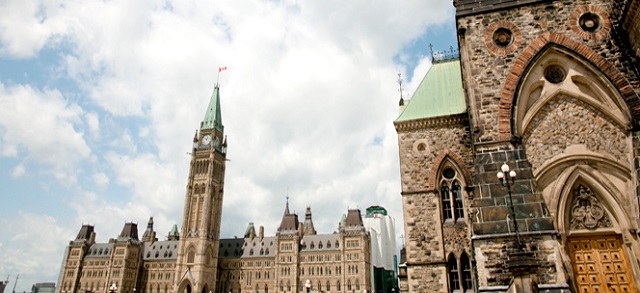Business
Poll shows eight-in-10 Canadians oppose MP pay raise

The Canadian Taxpayers Federation released Leger polling showing 79 per cent of Canadians are against the upcoming member of Parliament pay raise on April 1.
“The poll results are crystal clear: the vast majority of Canadians don’t think MPs deserve a raise,” said Franco Terrazzano, CTF Federal Director. “It seems like the only Canadians who strongly support an MP pay raise are the politicians themselves.”
The Leger poll asked Canadians if they support or oppose the upcoming MP pay raise. Results of the poll show:
- 59 per cent strongly oppose
- 20 per cent somewhat oppose
- 10 per cent somewhat support
- 3 per cent strongly support
- 9 per cent unsure
Among those decided on the issue, 86 per cent of Canadians oppose the MP pay raise.
MPs give themselves pay raises each year on April 1, based on the average annual increase in union contracts with corporations that have 500 or more employees.
A backbench MP’s salary is currently $203,100. A minister collects $299,900, while the prime minister takes home a $406,200 annual salary.
The CTF estimates this year’s pay raise will amount to an extra $6,700 for backbench MPs, $9,800 for ministers and $13,400 for the prime minister, based on contract data published by the federal government.
After this year’s pay raise, backbench MPs will receive a $209,800 annual salary, according to CTF estimates. A minister will collect $309,700 and the prime minister will take home $419,600.
“Do MPs really want to pad their pockets with higher pay as they head into an election?” Terrazzano said. “After a pandemic, tax hikes, a cost-of-living crisis and now a painful tariff war, there’s no way MPs should be taking more money from their constituents.
“If politicians want to be true champions for taxpayers, they must push to stop this MP pay raise.”
The federal government stopped automatic MP pay raises from 2010 to 2013.
2025 Federal Election
MEI-Ipsos poll: 56 per cent of Canadians support increasing access to non-governmental healthcare providers

-
Most believe private providers can deliver services faster than government-run hospitals
-
77 per cent of Canadians say their provincial healthcare system is too bureaucratic
Canadians are increasingly in favour of breaking the government monopoly over health care by opening the door to independent providers and cross-border treatments, an MEI-Ipsos poll has revealed.
“Canadians from coast to coast are signalling they want to see more involvement from independent health providers in our health system,” explains Emmanuelle B. Faubert, economist at the MEI. “They understand that universal access doesn’t mean government-run, and that consistent failures to deliver timely care in government hospitals are a feature of the current system.”
Support for independent health care is on the rise, with 56 per cent of respondents in favour of allowing patients to access services provided by independent health entrepreneurs. Only 25 per cent oppose this.
In Quebec, support is especially strong, with 68 per cent endorsing this change.
Favourable views of accessing care through a mixed system are widespread, with three quarters of respondents stating that private entrepreneurs can deliver healthcare services faster than hospitals managed by the government. This is up four percentage points from last year.
Countries like Sweden and France combine universal coverage with independent providers and deliver faster, more accessible care. When informed about how these health systems run, nearly two in three Canadians favour adopting such models.
The poll also finds that 73 per cent of Canadians support allowing patients to receive treatment abroad with provincial coverage, which could help reduce long wait times at home.
Common in the European Union, this “cross-border directive” enabled 450,000 patients to access elective surgeries in 2022, with costs reimbursed as if they had been treated in their home country.
There’s a growing consensus that provincial healthcare systems are overly bureaucratic, with the strongest agreement in Alberta, B.C., and Quebec. The proportion of Canadians holding this view has risen by 16 percentage points since 2020.
Nor do Canadians see more spending as being a solution: over half say the current pace of healthcare spending in their province is unsustainable.
“Governments shouldn’t keep doubling down on what isn’t working. Instead, they should look at what works abroad,” says Ms. Faubert. “Canadians have made it clear they want to shift gears; now it’s up to policymakers to show they’re listening.”
A sample of 1,164 Canadians aged 18 and older was polled between March 24th and March 28th, 2025. The margin of error is ±3.3 percentage points, 19 times out of 20.
The results of the MEI-Ipsos poll are available here.
* * *
The MEI is an independent public policy think tank with offices in Montreal, Ottawa, and Calgary. Through its publications, media appearances, and advisory services to policymakers, the MEI stimulates public policy debate and reforms based on sound economics and entrepreneurship.
Education
Schools should focus on falling math and reading skills—not environmental activism

From the Fraser Institute
In 2019 Toronto District School Board (TDSB) trustees passed a “climate emergency” resolution and promised to develop a climate action plan. Not only does the TDSB now have an entire department in their central office focused on this goal, but it also publishes an annual climate action report.
Imagine you were to ask a random group of Canadian parents to describe the primary mission of schools. Most parents would say something along the lines of ensuring that all students learn basic academic skills such as reading, writing and mathematics.
Fewer parents are likely to say that schools should focus on reducing their environmental footprints, push students to engage in environmental activism, or lobby for Canada to meet the 2016 Paris Agreement’s emission-reduction targets.
And yet, plenty of school boards across Canada are doing exactly that. For example, the Seven Oaks School Division in Winnipeg is currently conducting a comprehensive audit of its environmental footprint and intends to develop a climate action plan to reduce its footprint. Not only does Seven Oaks have a senior administrator assigned to this responsibility, but each of its 28 schools has a designated climate action leader.
Other school boards have gone even further. In 2019 Toronto District School Board (TDSB) trustees passed a “climate emergency” resolution and promised to develop a climate action plan. Not only does the TDSB now have an entire department in their central office focused on this goal, but it also publishes an annual climate action report. The most recent report is 58 pages long and covers everything from promoting electric school buses to encouraging schools to gain EcoSchools certification.
Not to be outdone, the Vancouver School District (VSD) recently published its Environmental Sustainability Plan, which highlights the many green initiatives in its schools. This plan states that the VSD should be the “greenest, most sustainable school district in North America.”
Some trustees want to go even further. Earlier this year, the British Columbia School Trustees Association released its Climate Action Working Group report that calls on all B.C. school districts to “prioritize climate change mitigation and adopt sustainable, impactful strategies.” It also says that taking climate action must be a “core part” of school board governance in every one of these districts.
Apparently, many trustees and school board administrators think that engaging in climate action is more important than providing students with a solid academic education. This is an unfortunate example of misplaced priorities.
There’s an old saying that when everything is a priority, nothing is a priority. Organizations have finite resources and can only do a limited number of things. When schools focus on carbon footprint audits, climate action plans and EcoSchools certification, they invariably spend less time on the nuts and bolts of academic instruction.
This might be less of a concern if the academic basics were already understood by students. But they aren’t. According to the most recent data from the Programme for International Student Assessment (PISA), the math skills of Ontario students declined by the equivalent of nearly two grade levels over the last 20 years while reading skills went down by about half a grade level. The downward trajectory was even sharper in B.C., with a more than two grade level decline in math skills and a full grade level decline in reading skills.
If any school board wants to declare an emergency, it should declare an academic emergency and then take concrete steps to rectify it. The core mandate of school boards must be the education of their students.
For starters, school boards should promote instructional methods that improve student academic achievement. This includes using phonics to teach reading, requiring all students to memorize basic math facts such as the times table, and encouraging teachers to immerse students in a knowledge-rich learning environment.
School boards should also crack down on student violence and enforce strict behaviour codes. Instead of kicking police officers out of schools for ideological reasons, school boards should establish productive partnerships with the police. No significant learning will take place in a school where students and teachers are unsafe.
Obviously, there’s nothing wrong with school boards ensuring that their buildings are energy efficient or teachers encouraging students to take care of the environment. The problem arises when trustees, administrators and teachers lose sight of their primary mission. In the end, schools should focus on academics, not environmental activism.
-

 2025 Federal Election2 days ago
2025 Federal Election2 days agoNo Matter The Winner – My Canada Is Gone
-

 2025 Federal Election2 days ago
2025 Federal Election2 days agoASK YOURSELF! – Can Canada Endure, or Afford the Economic Stagnation of Carney’s Costly Climate Vision?
-

 2025 Federal Election2 days ago
2025 Federal Election2 days agoCSIS Warned Beijing Would Brand Conservatives as Trumpian. Now Carney’s Campaign Is Doing It.
-

 2025 Federal Election1 day ago
2025 Federal Election1 day agoInside Buttongate: How the Liberal Swamp Tried to Smear the Conservative Movement — and Got Exposed
-

 Alberta2 days ago
Alberta2 days agoProvince to expand services provided by Alberta Sheriffs: New policing option for municipalities
-

 Alberta2 days ago
Alberta2 days agoMade in Alberta! Province makes it easier to support local products with Buy Local program
-

 International2 days ago
International2 days agoTulsi Gabbard tells Trump she has ‘evidence’ voting machines are ‘vulnerable to hackers’
-

 COVID-191 day ago
COVID-191 day agoCOVID virus, vaccines are driving explosion in cancer, billionaire scientist tells Tucker Carlson











